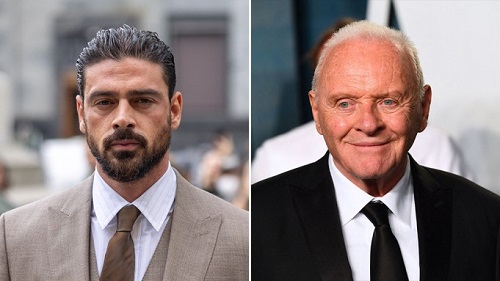Maserati Film Producer wants a True Italian Cinema
TORONTO – Italian Film Producer Andrea Iervolino just announced that 365 Days star Michele Morrone will be joining the cast of his new movie Maserati: The Brothers, alongside film legend Anthony Hopkins. Morrone will star as Alfieri Maserati, the founding member of the company (formed in 1914), who would later be joined by his brothers Bindo, Ettore and Ernesto. The film follows the family behind the high performance luxury/sports car, perhaps the least known among its competitors when considering brands like Jaguar, Aston Martin, Porsche, Audi or Mercedes.
Curiously, Hopkins is an avid car collector and owns a fleet of classics – some of which he purchased from various film sets throughout his career, like the 1965 Aston Martin DB5, which was featured in the Bond film Thunderball. More importantly, the Welsh acting legend also owns one of Maserati’s stand out models, the 2010 Maserati Quattroporte, and will play an Italian financier who bankrolls the Maserati brothers.
Along with the film’s announcement Iervolino included a mission statement, the sort of declaration that points out an obvious truth with a less obvious solution: “I am deeply committed to promoting Italian actors worldwide, and casting Michele Morrone in such a prominent role is a step toward that goal,” Iervolino said. “By fostering this talent, we can accelerate the internationalization of Italian cinema, ultimately transforming it into a true industry with worldwide recognition”. A rousing sentiment, but the premise is a bit confused.
Italian Cinema is already a “true industry” with worldwide recognition. Italian cinema is and has been – for decades – consumed internationally. Historically, its influence on global cinema, whether through its Neorealist movement and directors like Fellini or via its global stars like Loren, has long been a point of reference for filmmakers and cineastes worldwide. Not to mention the Italian-American influence within the Hollywood Studio system.
But perhaps it’s this very legacy that’s been the albatross around Italy’s neck, which Iervolino is presumably pointing out. Why hasn’t Italian Cinema [according to Iervolino] maintained its historic influence?
According to the Italic Institute of America and a study that looked at 1,512 depictions of Italians from 1914 to 2014 (in American films), 68.5% of the films researched painted “a negative attitude toward Italian-Americans and Italian culture in general”. It’s an interesting and somewhat useful collation of information, but it’s not entirely without a bias. Assuming that there’s a conscious or unconscious agenda against Italians [or any group] can lead to some confused assertions about the art form and the people behind it.
Instead, what is needed are bold financiers and producers – and Iervolino appears to be raising his hand here – to tell meaningful stories about Italy and its people. And preferably without trying to “Internationalize” what is already a highly valued product. If we want a bigger Italian film industry, why not primarily invest in Italian talent and stories? What was “Made in Italy” never hinged on what appealed to International consumers. It’s always been about high quality craftsmanship. Step one.
In the pics: Mario, Ernesto, Ettore and Bindo Maserati; Michele Morrone and Anthony Hopkins (photos courtesy of Getty Images)
Massimo Volpe is a filmmaker and freelance writer from Toronto: he writes reviews of Italian films/content on Netflix





